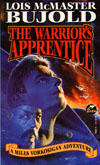
It was bound to happen sooner or later. Everything Hypatia (the librarian at Alexandria Digital Literature) recommended to me could not match its predicted rating. Maybe in the future, when the system has 10s of thousands of patrons, the recommender will be right on, but for now, there’s bound to be some things a little off. Why? With so few patrons, the number of books that have a large enough percentage of people who have read them is fairly small, so those few books that almost everyone has read (Tolkien, Shakespeare, Twain) will tend to rise to the top of everyone’s recommendation list. Because the AlexLit clientele is decidedly SF oriented, this includes the favorites of the genre, such as Heinlein, Card, and, of course, Bujold.
The company of Heinlein and Card are apt for Bujold, for her style and plot are quite similar, if I can make generalizations based on one book. The Warrior’s Apprentice is the “first” book about Miles Vorkosigan (I have to put first in quotes because on Bujold’s timeline, she has actually written prequels which feature Miles’ parents). Miles is your classic SF protagonist–a misunderstood young boy with a handicap who has a mind that can solve any problem. I call this the classic because a majority of the science fiction audience can easily project themselves onto Miles without difficulty (that demographic being young boys from 11 to 17, readers who likely excel at math or other problem solving areas, yet are inept at sports). I understand the pull; I was part of this demographic once. That is why I remember Heinlein fondly, because I read him at this particular time in my life. But this is also why I dislike Card’s hugely popular Ender’s Game and Bujold’s equally popular Vorkosigan series, because I encountered them outside of that niche and thus recognized the obvious wish-fulfillment nature of the tales.
Aside from the simplistic plot structure, I continually stumbled on the poor prose. I realize that this was one of Bujold’s first books, and she may have gotten to be a better writer in later volumes, but this was the particular one recommended to me. How bad is it? Let’s look at some examples:
- “That’s right,” Miles snarled. [pg. 5]
- “That awful holovid,” she glowered. [pg. 89]
- “The last rate,” Miles hissed. [pg. 199]
Try to hiss the words “the last rate.” You can’t. I doubt you can snarl “that’s right,” either, and don’t even ask me how to glower words. These examples were picked by just opening the book at random–I could probably come up with many more in this vein. On style, things aren’t much better. Most of the characters are little more than talking heads, who are necessary to pass information to Miles.
I can’t continue. It was interesting to read one Bujold, to be able to discuss her with reason, rather than simply dismiss her out-of-hand. I’ll put her over with Card; two writers who will continue to be popular, but who can safety be ignored by those wanting more than the Hardy Boys in space.
Postscript 2004: For this commentary, I became persona non gratia with a large segment of rec.arts.sf.written and those who read reviews on Amazon.com. I even had a back-and-forth interaction with Bujold herself on my criticism of her prose style. Most people didn’t care for my dismissing Bujold for her style, as they contended that’s not what you read her books for. My point is that I don’t read a book simply for technique but when the technique is poor, it creates a barrier to my enjoyment of the work, no matter how good the content is. The analogy Bujold used is that I was concentrating on a single brick, rather than on the entire building. My counter analogy was that reading her was like watching a film about a building where the boom constantly appears or where you can tell that the brick wall is actually styrofoam–it breaks the illusion of the story.
[Finished 1997]
